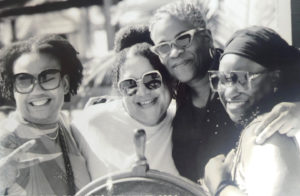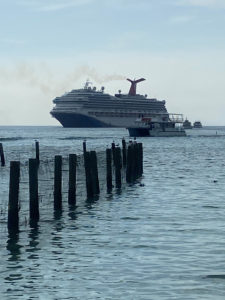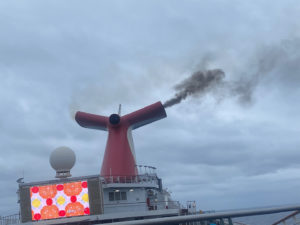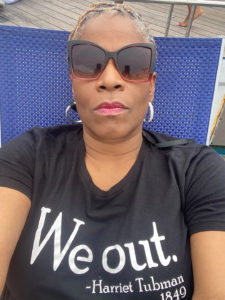It’s the last day of a four-day cruise. I’ve been to Nassau, Bahamas, Princess Cay Island, and now a day “at sea,” before returning to Port Canaveral, Florida.
 I am cruising with three great women-friends! I love them. They each are so powerful in their own, unique ways! And we’ve been friends, each one of them, and me, for years!
I am cruising with three great women-friends! I love them. They each are so powerful in their own, unique ways! And we’ve been friends, each one of them, and me, for years!
The sky is overcast. The water is so beautiful. My girlfriends and I have spent time in the water at each beach, just relaxing and talking, crying and laughing. The water has been our context, our landscape, our source of healing.
 Being in the ocean, here’s what I notice. Water is so plentiful!!! Why, literally on Earth, would there be places without enough water for drinking and bathing? When humans commodify nature, humans create injustice.
Being in the ocean, here’s what I notice. Water is so plentiful!!! Why, literally on Earth, would there be places without enough water for drinking and bathing? When humans commodify nature, humans create injustice.
High lead levels in water, for example, is a human tragedy. Yes, the effort to transport water for human use and consumption was/is a noble goal. But …
As I sit, relaxing on the deck of this cruise ship, I’m watching the exhaust from the combustion of fossil fuels on this massive ship! It is sad to notice this, and to realize I’m one of the few who do.
 Yet, it is beyond wonderful to be on this ship. It is relaxing (when I’m not focusing on the harm to nature), fun, exciting … I am having a blast. And, while it has taken us to destinations to afford us the opportunity to explore other cultures, food, and beautiful landscapes of palm trees, flowers, and animals, the operation of this massive cruise liner has polluted the air and the water, tremendously. Again, a noble objective to give humans a special experience of relaxation, enjoyment, and adventure, but at what cost?
Yet, it is beyond wonderful to be on this ship. It is relaxing (when I’m not focusing on the harm to nature), fun, exciting … I am having a blast. And, while it has taken us to destinations to afford us the opportunity to explore other cultures, food, and beautiful landscapes of palm trees, flowers, and animals, the operation of this massive cruise liner has polluted the air and the water, tremendously. Again, a noble objective to give humans a special experience of relaxation, enjoyment, and adventure, but at what cost?
Many of the environmental injustices, including the harm done to the environment, are a result of human efforts to give a quality of life to humans: from generating potable water for consumption, to creating adventure for enjoyment and relaxation. But there is a cost.
What are the solutions to this conundrum?
As a (formerly practicing) mechanical engineer, I know that companies/industries make decisions every day about how to produce their products: what materials to use, how to deliver products, what to use for packaging, for transporting liquids (i.e., piping systems), as well as decisions regarding how to generate power, what to use for fuel, etc. And I wonder if the decision to make products and processes “environmentally friendly” can be a mandate! I wonder if it can be a requirement or strong suggestion with incentives, from the government, even the United Nations!
Currently, choosing to be environmentally friendly may add cost. But it would not impact competitive pricing if all companies in an industry were required to do the same. And the reality is that those companies could invest in things like solar power or other clean energy options for their facility operations, saving the cost of using fossil fuels, for example, and ultimately lowering the cost of their operations. This would indeed take time, and it would indeed be an investment. But our planet would suffer less, and so would all of its inhabitants.
I wonder if the engineering curriculum, for example, at any university, is teaching environmental consciousness as core, CORE curriculum! According to my son, Curtis, who recently graduated with a degree in Mechanical Engineering, the answer is no.
We, as humans, can do better, if we intentionally choose to do so.
—Rev. Veronica M. Johnson
 Rev. Veronica M. Johnson is the Co-Pastor of Hyde Park Union Church in Chicago; the Outreach Director of Faith in Place, a multi-faith environmental organization; and the chairperson of the Anti-Violence Task Force of the Hyde Park & Kenwood Interfaith Council. Rev. Johnson earned a bachelor of science degree in mechanical engineering from the University of Illinois, Urbana/Champaign, and a master of divinity degree from McCormick Theological Seminary. Central to her personal life, ministry, environmental and antiviolence work in the community is the scripture Micah 6:8 “… and what does the Lord require of you but to do justice and to love kindness and to walk humbly with your God?”
Rev. Veronica M. Johnson is the Co-Pastor of Hyde Park Union Church in Chicago; the Outreach Director of Faith in Place, a multi-faith environmental organization; and the chairperson of the Anti-Violence Task Force of the Hyde Park & Kenwood Interfaith Council. Rev. Johnson earned a bachelor of science degree in mechanical engineering from the University of Illinois, Urbana/Champaign, and a master of divinity degree from McCormick Theological Seminary. Central to her personal life, ministry, environmental and antiviolence work in the community is the scripture Micah 6:8 “… and what does the Lord require of you but to do justice and to love kindness and to walk humbly with your God?”
Rev. Johnson is one of Prairiewoods’ Spirituality in the 21st Century: Hope in Action facilitators. Join her, Susan Bauer-Wu, Leah Rampy and Sara Thomsen April 26–27, 2024, for an inspiring weekend that will help us get inspired, get informed and get into action!


